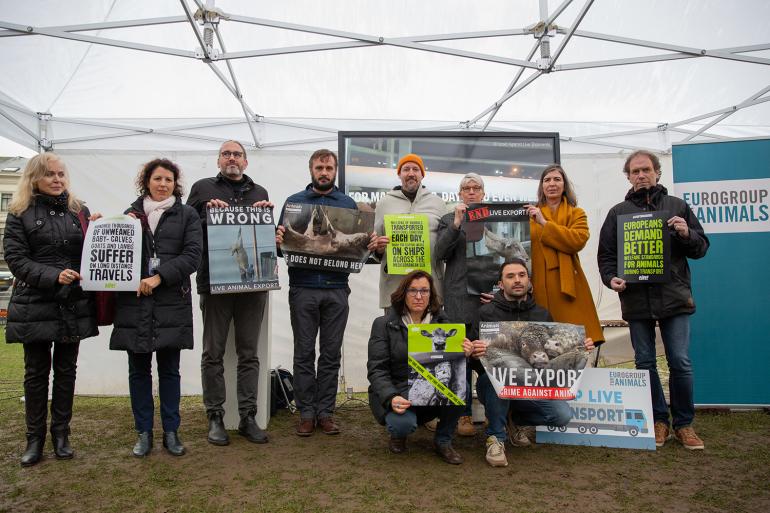A protest action took place on Tuesday in front of the European Parliament ahead of a crucial vote in the European Parliament against live animal transport over long distances and live export.
The action was organised by animal welfare NGOs in Brussels and accompanied by speeches from a a number of MEPs across party lines.
For the past year the Parliamentary Committee of Inquiry on the Protection of Animals during Transport (ANIT) has analysed the implementation of EU rules by member states and the correct enforcement by the European Commission.
The draft Report and relevant recommendations are going to be voted in the Committee on Thursday (2 December) and put forward for adoption by the plenary in January 2022. In the pipeline is also a revision of the Transport Regulation, for which a new legislative proposal is expected in 2023.
Animal welfare NGO Eurogroup for Animals told The Brussels Times that it has been campaigning for decades to stop live transport and has issued a white paper how it should be done in line with recommendations made by the European Food Safety Authority, the World Animal Health Organisation and the Federation of the Veterinarians of Europe.
For the time being, every year over one billion animals are transported in the EU and from the EU to third countries without effective protection. EU has become the world’s biggest live animal exporter, according to the NGOs.
“Over the years we witnessed endless and avoidable suffering: animals crammed on overcrowded and unsuitable trucks and vessels, and animals unfit for transport, such as pregnant, young or injured ones. The tragedies at sea and on the road have given the ANIT Committee plenty of evidence to stop live transport”, commented Reineke Hameleers, CEO, Eurogroup for Animals.
MEP Anja Hazekamp (The LEFT) is Vice Chair of the ANIT Committee and President of the Intergroup on the Welfare and Conservation of Animals. "The way animals are transported in the EU is heart-breaking, devastating and unbelievably brutal and cruel,” she said. “The investigation of the ANIT Committee confirmed that animals are currently not protected during transport and that changes are urgently needed.”
“I expect from my colleagues in the ANIT Committee that they give a strong message to the European Parliament: long-distance transport, live export and the transport of vulnerable animals, such as unweaned animals, so-called 'end-of-career' animals and pregnant animals, must be stopped,” she added.
Live animal transports are extremely important from an animal welfare viewpoint, Swedish MEP Emma Wiesner (Renew Europe) told The Brussels Times. “Our patience is running out. Transports take place in poor conditions where the temperature is not regulated, there is not enough space for the animals and they don’t get water during the transport. In addition, the transport distances are far too long.”
Which member states are most in breach of current regulations?
“There are many member states that violate current regulations. Romania, Greece and Spain are some that occur relatively frequently. Member states that do not comply with the law must be sued. The European Commission has every legal opportunity to do this, but has repeatedly failed to use this tool.
“In our compromise proposal, we set a limit of eight hours in transport. That is the current limit that already exists in Sweden,” she added.
Is there a majority in the parliament for changes to the legislation and for better compliance with the regulations?
“In the committee of inquiry, there is now a majority behind the compromises and I hope that they will go through. Europe must become better at taking animal welfare seriously. It’s about countries complying with laws and regulations already in place and about the total time that live animals can be transported. We need also to ensure that we control transports that go outside the EU,” MEP Wiesner concludes.
Update: The article has been updated to include an interview with MEP Emma Wiesner.
M. Apelblat
The Brussels Times

